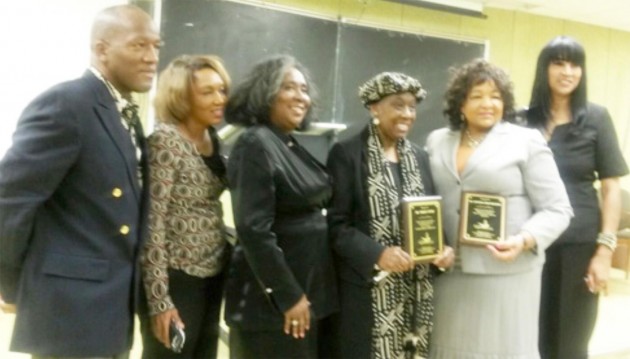
The Department of Criminal Justice celebrated Black History Month by hearing a speech, singing songs, and observed an honoree acknowledged for her service. On Thursday, Feb. 20 in Charles P. Adams Hall auditorium, Dr. Grace Tatem, a retired faculty member in the Grambling School of Social Work, was honored.
“The month of February, the shortest month of the year, has been designated as the time to focus on the contributions of Black citizenry to our nation,” said Tatem. “That is good but I believe that one’s history, regardless of your race, should be passed on to its people, especially its children, as an ongoing process.”
Rev. Samuel Joseph, a native of Ruston, recited the “I Have a Dream Speech” written and delivered by Dr. Martin Luther King Jr. on Aug 28, 1963, at the Lincoln Memorial in Washington D.C.
Joseph spoke with much enthusiasm and the room was engaged in the speech. He continued with emotion behind each word and painted a picture of the growth in African Americans shifting from poverty to pursuit of happiness.
“I was amazed by the meaning and the manner of Martin Luther King Jr.’s “I Have A Dream Speech”, said Evette Gipson, a graduate criminal justice student. As I listened to the speech I felt like I experienced all of the situations he spoke about, I believe King set an outstanding example and path for all people and his primary goal was for all to be free and equal.”
Tatem does not feel that King’s dream has been fulfilled entirely. The honoree believes that although much has been accomplished, individuals, groups, and America still have a distance to go. She believes that efforts are being made daily toward his dream of equality and freedom for all.
“I have had many experiences of racism in my 75 years of life,” said Tatem who grew up in Greenwood, MS.
“My greatest experiences of racism were encountered in Pennsylvania and California, not the deep south. My civil rights teaching and training under Dr. King Jr. and his staff occurred as they had the opportunity to visit Fisk University’s campus, a student these opportunities taught me how to handle any situation in a nonviolent, nonthreatening, and law abiding manner,” Tatem said.
Tatem was honored for her characteristics that are similar to Dr. King Jr.’s, such as her service to others, her spiritual and religious tasks, volunteer work, community service projects for senior citizens, and her commitment.
“I am very appreciative of the honor bestowed upon me by the Criminal Justice
Department, but to God be the glory,” Tatem said. ” God blesses me to do what I do in carrying out his purpose for my being on earth. My service to others is serving Him.”
Tatem, who attended Fisk University from 1956-1960 in Nashville, is an active member of St. Luke’s Episcopal Chapel; a lifetime member of Delta Sigma Theta Sorority Inc., the Fisk and Grambling alumni association, the National Association of Social Workers ;Lambda Phi Chapter of Phi Alpha, and Pi Gamma Mu Honor Society.
She has one daughter Dr. Beatrice Tatem, a psychologist, who owns and operates a counseling service in Monroe.
Dr. LaWanna Gunn-Williams, spoke at the program, reminded the audience of those who contributed to securing justice.
Gunn-Williams received her masters of arts in teaching degree from Grambling State University. She is a professor of psychology and department chairperson at GSU. She is a Licensed Marriage and Family Therapist in the Monroe area.
Some heroes mentioned were Rosa Parks, Booker T. Washington, Martin Luther King Jr., Shirley Chisholm, Hank Aaron, Tony Dungy and the 45th U.S. President Barack Obama. Some of GSU’s own mentioned included James “Shack” Harris, a former pro football player for the Detroit Lions, and Doug Williams, former GSU football coach, and first African American quarterback to win the Super Bowl.
She also spoke about the safety of our African American males, and the racial bias in justifiable homicides.
Gunn-Williams brought up names of African American men whom were slain.
by White males. Trayvon Martin, 17-year-old shot by George Zimmerman, a neighborhood watch volunteer, in Sanford, Fla.; Jordan Davis, the Florida teen who was fatally shot by Michael Dunn over loud music, and James Byrd, Jr., dragged to death by two white males supremacists, down a three-mile stretch of country road simply because he was Black in Jasper, Texas, on June 7, 1998.
Lastly, Gunn-Williams expressed what School-to-Prison Pipeline was and pointed out that many advocates point to data showing that excessive disciplinary policies disproportionately target Black, low-income and disabled students.
The program mentioned several Black history facts, resources, opportunities, advantages and disadvantages. It also showed the audience the extended support of Dr. King and Black History is all a part of American History.
“As families, parents, grandparents, churches, organizations, schools, etc., these individuals have the responsibility to teach and educate their people, Tatem said. “It is important to know and understand one’s past as preparations are made for the future as our African American heroes go forth.”
The Criminal Justice Black History committee included professors Joyce Montgomery-Scott, Lurie Thomason, Mae Conley and Reller Jones.
